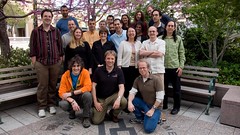Richard Cohen thinks that algebra is highly overrated.
Here’s the thing, Gabriela: You will never need to know algebra. I have never once used it and never once even rued that I could not use it. You will never need to know — never mind want to know — how many boys it will take to mow a lawn if one of them quits halfway and two more show up later — or something like that. Most of math can now be done by a computer or a calculator. On the other hand, no computer can write a column or even a thank-you note — or reason even a little bit. If, say, the school asked you for another year of English or, God forbid, history, so that you actually had to know something about your world, I would be on its side. But algebra? Please.
Steven Johnson comes close to making the same point, but actually has some real perspective:
In the offices of the future, which skill set will today’s kids draw upon in their day-to-day tasks? Mastering interfaces, searching for information, maintaining virtual social networks and multitasking? Or doing algebra? I think the answer is obvious. It’s a good bet that 99% of kids will never use algebra again after they graduate from high school. And yet thanks to the testing establishment, we know a staggering amount about the algebraic skills of today’s teenagers but next to nothing about the skills they’re actually going to use.
Johnson argues that teenagers who play (for instance) massively multiplayer online games develop a broad set of skills that might be more applicable to their employment than algebra, and I think it would be hard to disagree at some level. After all, most people do not get paid to innovate, or even produce, but merely to move information (often in the form of money) from one place to another.  But I think the bigger question is “how do educate children to create a better society, as opposed to a better work force.”  No amount of playing Ragnarok online is going to result in the cotton gin, the steam engine, or the polio vaccine.  For that we need people willing to learn and apply the methodologies of science and mathematics.
Kenneth Silber’s article provided the two links above.
[tags]Rants and Raves[/tags]

 Here’s a picture of the 36 inch telescope at Chabot Observatory, with an 8 second exposure and some GIMP work to bring out some of the details. The shot is illuminated mostly by the (nearly full) moonlight. The camera is actually pretty noise free in green light, and the red isn’t terrible, but blue is really, really grainy. You can’t really tell in this size, but you could try looking at the
Here’s a picture of the 36 inch telescope at Chabot Observatory, with an 8 second exposure and some GIMP work to bring out some of the details. The shot is illuminated mostly by the (nearly full) moonlight. The camera is actually pretty noise free in green light, and the red isn’t terrible, but blue is really, really grainy. You can’t really tell in this size, but you could try looking at the 


